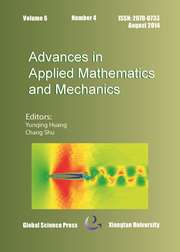Crossref Citations
This article has been cited by the following publications. This list is generated based on data provided by Crossref.
Shen, Wanfang
Ge, Liang
Yang, Danping
and
Liu, Wenbin
2015.
Sharp A Posteriori Error Estimates for Optimal Control Governed by Parabolic Integro-Differential Equations.
Journal of Scientific Computing,
Vol. 65,
Issue. 1,
p.
1.
Shen, Wanfang
2016.
Full-discrete adaptive FEM for quasi-parabolic integro-differential PDE-constrained optimal control problem.
Boundary Value Problems,
Vol. 2016,
Issue. 1,
Lu, Zuliang
and
Zhang, Shuhua
2017.
L ∞ -error estimates of rectangular mixed finite element methods for bilinear optimal control problem.
Applied Mathematics and Computation,
Vol. 300,
Issue. ,
p.
79.
Wang, Shuo
Zheng, Xiangcheng
and
Du, Ning
2024.
Finite element method for an optimal control problem governed by a time fractional wave equation.
Computers & Mathematics with Applications,
Vol. 164,
Issue. ,
p.
45.
Wang, Shuo
Ma, Jie
and
Du, Ning
2025.
A stabilizer-free weak Galerkin finite element method for an optimal control problem of a time fractional diffusion equation.
Mathematics and Computers in Simulation,
Vol. 231,
Issue. ,
p.
99.


